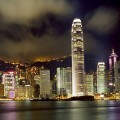The lights in parts of Hong Kong went out Tuesday evening, as people turned them off to protest worsening air pollution in the city.
At exactly 8:00 p.m. Tuesday, employees in more than 40 branches of Hong Kong's biggest coffee chain, Pacific Coffee, switched off floor lamps and dimmed other lights to join a territory wide campaign against worsening air pollution. People in homes, offices and shops all over the territory joined in.
The "Lights Out" protest was the idea of Alastair Robins, a British expatriate, who says he is fed up with what he calls "the government's failure to clean the air." "We've just decided that enough is enough, and we don't feel our government is acting on our behalf to clear this pollution," he explained. "We just said, look guys, everybody turn your lights off to show the government that we want action taken. Something needs to be done in this city, and it's not happening." Hong Kong's bad air comes mostly from across the border in China proper, where factories and coal-fired electricity plants have created some of the world's worst air pollution. But Hong Kong is to blame for at least 20 percent of its own problems.
Smog often shrouds the city. The government says visibility dropped to less than eight kilometers 20 percent of the time last year, compared with 10 percent of the time only three years earlier.
Many here are frustrated at what they see as the government's slow reaction to the worsening problem. The government says it is taking steps to address the problem, including imposing stricter caps on emissions of the territory's power plants, which also burn coal. Hong Kong Chief Executive Donald Tsang last week vowed to get the power companies to meet stricter air-quality standards.
"I am determined to ensure that this standard will be complied with by the power companies. It is important, " he said. But Mr. Tsang refused to join Tuesday's campaign, turning down a request by the campaigners to cancel the daily 8 p.m. light show staged in the famous harbor for tourists.
A recent study by the University of Hong Kong found that pollution is costing Hong Kong as much as $160 million in health expenses annually. Some business executives are also concerned that pollution is driving businesses away from the city, and making it harder to attract managers from abroad.
On Tuesday afternoon, Hong Kong's environment bureau recorded air pollution level at "medium to very high" - meaning those with respiratory and heart illnesses were advised to limit outdoor activities. In contrast, air quality in Singapore Tuesday afternoon was "good," while Sydney's pollution level was "low."

